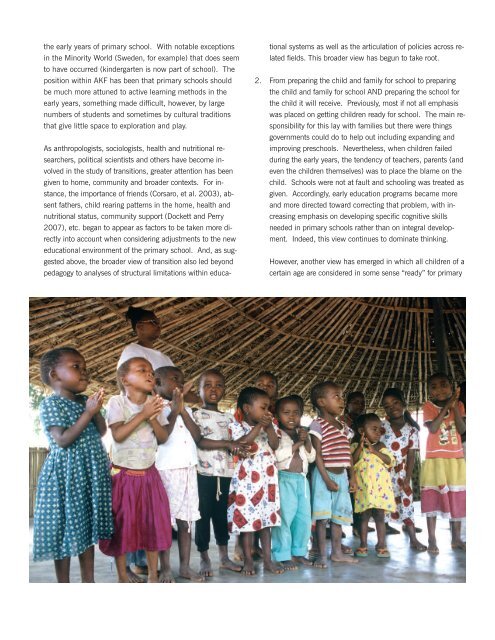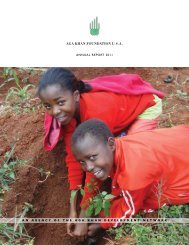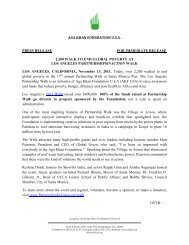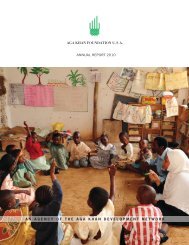2010 Annual Report: Education - PartnershipsInAction
2010 Annual Report: Education - PartnershipsInAction
2010 Annual Report: Education - PartnershipsInAction
Create successful ePaper yourself
Turn your PDF publications into a flip-book with our unique Google optimized e-Paper software.
the early years of primary school. With notable exceptions<br />
in the Minority World (Sweden, for example) that does seem<br />
to have occurred (kindergarten is now part of school). The<br />
position within AKF has been that primary schools should<br />
be much more attuned to active learning methods in the<br />
early years, something made difficult, however, by large<br />
numbers of students and sometimes by cultural traditions<br />
that give little space to exploration and play.<br />
As anthropologists, sociologists, health and nutritional researchers,<br />
political scientists and others have become involved<br />
in the study of transitions, greater attention has been<br />
given to home, community and broader contexts. For instance,<br />
the importance of friends (Corsaro, et al. 2003), absent<br />
fathers, child rearing patterns in the home, health and<br />
nutritional status, community support (Dockett and Perry<br />
2007), etc. began to appear as factors to be taken more directly<br />
into account when considering adjustments to the new<br />
educational environment of the primary school. And, as suggested<br />
above, the broader view of transition also led beyond<br />
pedagogy to analyses of structural limitations within educational<br />
systems as well as the articulation of policies across related<br />
fields. This broader view has begun to take root.<br />
2. From preparing the child and family for school to preparing<br />
the child and family for school AND preparing the school for<br />
the child it will receive. Previously, most if not all emphasis<br />
was placed on getting children ready for school. The main responsibility<br />
for this lay with families but there were things<br />
governments could do to help out including expanding and<br />
improving preschools. Nevertheless, when children failed<br />
during the early years, the tendency of teachers, parents (and<br />
even the children themselves) was to place the blame on the<br />
child. Schools were not at fault and schooling was treated as<br />
given. Accordingly, early education programs became more<br />
and more directed toward correcting that problem, with increasing<br />
emphasis on developing specific cognitive skills<br />
needed in primary schools rather than on integral development.<br />
Indeed, this view continues to dominate thinking.<br />
However, another view has emerged in which all children of a<br />
certain age are considered in some sense “ready” for primary






